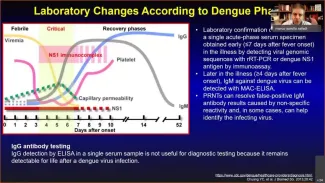A fatal case report of antibody-dependent enhancement of dengue virus type 1 following remote Zika virus infection
Bonheur AN, Thomas S, Soshnick SH, et al. A fatal case report of antibody-dependent enhancement of dengue virus type 1 following remote Zika virus infection. BMC Infect Dis 21, (2021) 21:749.

Antibody-dependent enhancement (ADE) in DENV infections can occur when a person with primary immunity is infected by a second, different DENV strain.
It has been hypothesized that prior Zika virus (ZIKV; DENV are closely related to ZIKV) infection could provoke ADE to DENV serotypes, particularly in in DENV naïve individuals. Bonheur et al. presents the first known case of a child in the US who rapidly died from travel-associated dengue, and who had previous exposure to ZIKV antibodies. The child was admitted to a New York hospital ~2 weeks after returning from the Dominican Republic, with a 4-day history of fever, headache, vomiting and abdominal pain. The child was diagnosed with hypovolemic and septic shock and died less than 24 h after hospitalization despite resuscitation efforts. Serologic evidence postmortem confirmed ZIKV infection prior to an acute DENV infection, as determined by the presence of antibodies to ZIKV nonstructural protein 1 and having a very high plaque reduction neutralization titer to ZIKV. The patient’s ZIKV immunoglobulin G avidity index was high, and DENV-1 RNA was detected in 10 organs and tissues.
These finding suggest that the child died from dengue hemorrhagic fever or dengue shock syndrome caused by probable ADE as a result of a prior ZIKV infection.
https://bmcinfectdis.biomedcentral.com/articles/10.1186/s12879-021-06482-0
VV-MEDMAT-56503
 Malaysia
Malaysia

